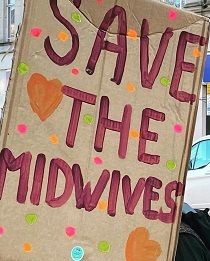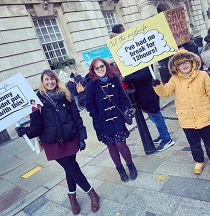AIMS Journal, 2022, Vol 34, No 1
 |
 |
 |
By Megan Disley
On Sunday 21st November 2021, midwives, doulas, other birth workers, mothers, fathers, children, and maternity supporters took to the streets in towns and cities across the UK to take part in peaceful vigils to raise awareness of the maternity crisis.
‘March With Midwives’ was founded by doulas (Becki Scott, Maddie McMahon, Verina Henchy, and Paula Cleary) after a conversation regarding concerns about the state of maternity services being expressed by many birth workers. They wanted to build a campaign to raise awareness of the conditions that midwives are facing, the strain midwives are under, and the impact that this is having on women and pregnant people. After creating a Facebook group, momentum built and vigils were soon organised up and down the United Kingdom.
I attended my local vigil in Colchester, Essex, along with my son and a few of my fellow first-year student midwives. As a student midwife I am very aware of the crisis in maternity. The overstretched staff, the fear of disciplinary or legal action, the bullying and toxic hierarchical management systems, and the silencing of whistleblowing when staff know conditions are unsafe[1]. I am aware of the impact on the mental health of midwives, and how for some of them this was leading to breaking point and them giving up the career they had worked so hard to enter. In a recent Royal College of Midwives (RCM) survey, for example, 57% of midwives said they would leave the profession within the next year[2]. There is also a real impact on parents. Midwives are doing their best in the current conditions, but stories of the service failing parents and the likely trauma of birth resulting from poor maternity care are numerous[3]; this will trickle down to future generations.
Starting the year, I was one of 90 excited students wanting to make a difference. But an RCM study suggests that such cohorts only make a small difference to the overall midwifery staffing situation: for every 30 newly qualified midwives graduating from universities each year, 29 existing midwives leave the profession[4]. So if that trend continues, out of my 90 strong group, only 3 of us will represent growth in the workforce. We need to grow the workforce faster than this.
As I write this, I am excited about beginning my placements in January. I have worked hard for this. But I am worried about the situation that I am going to walk into. This isn’t just one day in a woman’s life. As a mother myself, I know that it is much more than that; it is time to expose the painful truths of these lived experiences and the midwifery crisis. This is why I joined the March With Midwives movement.
A few dozen people attended the Colchester vigil. A speech was given by one of the midwives from the local trust, placards were on display, stories and thanks were shared in an open book (which will make its way to Downing Street with the many others across the UK thanks to the national steering group). Cars tooted in solidarity, signatures were added to the online petition (created by Cheryl Samuels , now a lecturer in midwifery) and, hopefully, passers-by paid attention and walked away understanding our concerns and hearing our pleas. I felt hopeful that our voices will be heard. I felt privileged to be part of that, and to know that I am working my way into a profession that truly cares about advocating for women, and that there are people outside of the profession that want to advocate for midwives.
Maternity service standards affect every single one of us: we are all born, after all. Everybody knows somebody that has given birth. If these stories come with trauma, that negativity and fear around birth is spread. We are already living with a generation where fear of birth is growing along with increased unnecessary medical intervention. I don’t want to see midwifery lose its core value of being ‘with woman’[5] because of staff shortages, burnout, and there simply not being enough time for midwives to listen well to women and advocate for them due to workload pressures. I don’t want to see women for generations to come fearing birth. Women and birthing people are powerful, their bodies are physiologically designed to give birth. We need to address that fear. Adequate funding and support for the maternity services is at the heart of that. Without more staff and reduced workloads, midwives are stuck not truly being able to deliver the time and women-centred care that they went into the profession to offer. After all, nobody answers their university midwifery interview question, ‘why do you want to be a midwife?’ without letting that passion for being ‘with woman’ shine through.
Over 80 vigils took place around the UK, not to mention the social media posts from those unable to attend in person. This demonstrated an incredible level of support, galvanised in just 5 weeks. And it doesn’t end here. The steering group are debriefing and planning the next steps and will be taking the petition to Downing Street with its 100,000 plus signatures. We must continue to raise awareness.
As a future midwife, it means so much to me that this action is being taken, offering an opportunity for our voices to be heard. I would like to thank the steering group for getting the movement off the ground, every single person who organised a vigil across the UK, and everyone who supported the vigils and those who shared and signed the petition.
Author Bio: Megan lives in Essex with her son, and is a first year student midwife at Anglia Ruskin University. She is passionate about breastfeeding support, and advocating for all women and birthing people. She is an AIMS volunteer working within the AIMS Campaigns Team with her main focus on health inequalities.
You can read the AIMS statement on March with Midwives here: https://www.aims.org.uk/campaigning/item/march-with-midwives
[1] March With Midwives, 2021. Manifesto drive.google.com/file/d/1lxqBBgNKFEC_3UrtjY6I8wiPgpnuqA48/view
[2] Royal College of Midwives, 2021. RCM warns of midwife exodus as maternity staffing crisis grows. www.rcm.org.uk/media-releases/2021/september/rcm-warns-of-midwife-exodus-as-maternity-staffing-crisis-grows
[3] Care Quality Commission, 2021. Safety, equity and engagement in maternity services. www.cqc.org.uk/publications/themes-care/safety-equity-engagement-maternity-services
[4] Royal College of Midwives, 2018. NHS gains just one extra midwife for every 30 trained – new RCM report. www.rcm.org.uk/media-releases/2018/september/nhs-gains-just-one-extra-midwife-for-every-30-trained-new-rcm-report
[5] Editor’s note: The word midwife derives from Old English mid, "with," and wif, "woman," and thus originally meant "with-woman,"
The AIMS Journal spearheads discussions about change and development in the maternity services..
AIMS Journal articles on the website go back to 1960, offering an important historical record of maternity issues over the past 60 years. Please check the date of the article because the situation that it discusses may have changed since it was published. We are also very aware that the language used in many articles may not be the language that AIMS would use today.
To contact the editors, please email: journal@aims.org.uk
We make the AIMS Journal freely available so that as many people as possible can benefit from the articles. If you found this article interesting please consider supporting us by becoming an AIMS member or making a donation. We are a small charity that accepts no commercial sponsorship, in order to preserve our reputation for providing impartial, evidence-based information.
AIMS supports all maternity service users to navigate the system as it exists, and campaigns for a system which truly meets the needs of all.